|
|
|
Sort Order |
|
|
|
Items / Page
|
|
|
|
|
|
|
| Srl | Item |
| 1 |
ID:
140039


|
|
|
|
|
| Publication |
London, Penguin Books Ltd, 1964.
|
| Description |
751p.pbk
|
| Standard Number |
0140191917
|
|
|
|
|
|
|
|
|
|
|
|
Copies: C:1/I:0,R:0,Q:0
Circulation
| Accession# | Call# | Current Location | Status | Policy | Location |
| 045590 | 808.83/KOE 045590 | Main | On Shelf | General | |
|
|
|
|
| 2 |
ID:
175487


|
|
|
|
|
| Summary/Abstract |
The influential Tamil writer Pudumaippittan turned to the short story to theorise the relationship between literature and society in the late colonial era. He used the genre’s brevity to compress his portrayals of well-known female types—such as widows, prostitutes and goodwives—into singular emotional events. This enabled Pudumaippittan to evoke the wider debates about tradition and modernity that these female types commonly represented without affirming the social reformist positions to which they were linked. Through the short story, Pudumaippittan dislodged his portrayals of the Indian woman from existing gender norms, prompting a shift from social realism to modernist realism within the Tamil literary sphere.
|
|
|
|
|
|
|
|
|
|
|
|
|
|
|
|
| 3 |
ID:
101385
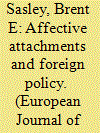

|
|
|
|
|
| Publication |
2010.
|
| Summary/Abstract |
Although the important role of emotions in decision-making has been highlighted in the psychology, neural science, and decision research literatures, this conclusion has not been widely adopted in foreign policy analysis and International Relations (IR). Of the work that has been done, much of it has been focused on public perceptions and the impact on foreign policy, but not on elites and the actual decisions of foreign policy. This article seeks to address this imbalance by examining the role of one element of emotion - affect - on key foreign policy decision-makers. It argues that the greater the emotional attachment a leader has to an object, the less flexible she is in foreign policy toward that object. The model is used to explain a critical puzzle in IR: Israel's decision to pursue and sign the 1993 Oslo Accords.
|
|
|
|
|
|
|
|
|
|
|
|
|
|
|
|
| 4 |
ID:
099794
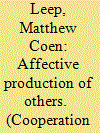

|
|
|
|
|
| Publication |
2010.
|
| Summary/Abstract |
IR scholars have recently turned to emotions to understand and explain events in world politics. Although this turn is appealing, most scholars have failed to critically examine the relationships between emotion, language, identity and foreign policy. This article aims to unpack these relationships. Drawing upon Sara Ahmed's notion of the 'emotionality of texts', this article explores how foreign policy may be an affective practice, which can be defined as a ritualized practice of discursively binding emotions to Others' identities and legitimating foreign policy through a discursive logic of feeling. In this way, identities are produced and policies are legitimated affectively. Neglecting the emotional narratives that constitute Self/Other relations leads to an insufficient understanding of emotion in global politics, an incomplete understanding of how identities emerge and matter as they do, and forecloses new alternatives of apprehending transformative ruptures and enduring patterns of Self/Other interaction. Through an analysis of United States policy towards the Israeli-Palestinian conflict, this article highlights the importance of emotion and affective practices in world politics.
|
|
|
|
|
|
|
|
|
|
|
|
|
|
|
|
| 5 |
ID:
104044
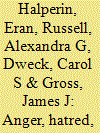

|
|
|
|
|
| Publication |
2011.
|
| Summary/Abstract |
Anger is often viewed as a destructive force in intergroup conflicts because of its links to aggressive behavior. The authors hypothesized, however, that anger should have constructive effects in those with low levels of hatred toward the out-group. Using experimental designs with subsamples of nationwide representative surveys, the authors conducted two studies within the context of the Israeli-Palestinian conflict. Study 1 showed that inducing anger toward Palestinians several weeks before the Annapolis summit increased support for making compromises in upcoming negotiations among those with low levels of hatred but decreased support for compromise among those with high levels of hatred. Study 2 showed that, even when a strong anger induction was used just days before the summit, the anger induction led to increased support for compromise among those low in hatred, but not among those high in hatred. The authors discuss the implications of these findings for informing a psychological understanding of conflicts.
|
|
|
|
|
|
|
|
|
|
|
|
|
|
|
|
| 6 |
ID:
189935
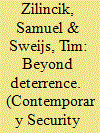

|
|
|
|
|
| Summary/Abstract |
Contrary to detailed work on deterrence by punishment, Western strategic thought about denial and its effects is conceptually muddled at the expense of effective strategy-making. This article seeks to reconceptualize denial and rethink its emotional effects. It defines denial as a strategy aimed at frustrating the adversary’s military power and proposes four different denial logics: capability elimination, operational paralysis, tactical degradation, and strategic effect reduction. It then turns to the effects through which these denial logics generate favorable consequences, and singles out the emotions of despondency, resignation, fear, and disappointment as the key factors that mediate their impact. The article offers a framework that can help guide further theoretical reflection and empirical research, as well as inform the development of policies and strategies in today’s world.
|
|
|
|
|
|
|
|
|
|
|
|
|
|
|
|
| 7 |
ID:
187116
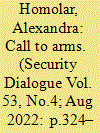

|
|
|
|
|
| Summary/Abstract |
The rhetoric leaders use to speak to domestic audiences about security is not simply bluster. Political agents rely upon stories of enmity and threat to represent what is happening in the international arena, to whom and why, in order to push national and international security policy agendas. They do so for the simple reason that a good story is a powerful political device. This article examines historical ‘calls to arms’ in the United States, based on insights from archival research at US presidential libraries and the United States National Archives. Drawing on narrative theory and political psychology, the article develops a new analytic framework to explain the political currency and staying power of hero–villain security narratives, which divide the world into opposing spheres of ‘good’ and ‘evil’. Shifting the conceptual focus away from speakers and settings towards audience and affect, it argues that the resonance of hero–villain security narratives lies in the way their plot structure keeps the audience in suspense. Because they are consequential rhetorical tools that shape security policy practices, the stories political agents tell about security demand greater attention in the broader field of international security studies.
|
|
|
|
|
|
|
|
|
|
|
|
|
|
|
|
| 8 |
ID:
087479
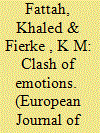

|
|
|
|
|
| Publication |
2009.
|
| Summary/Abstract |
After the attacks of 9/11 Americans asked, `Why do they hate us so much?' The answer has been framed in terms of a range of `clashes', none of which has addressed emotion, which is at the centre of the question. Emotion, and particularly humiliation, has begun to be addressed within the literature of IR. Numerous scholars have highlighted the pervasiveness of a discourse of humiliation in the Middle East and its relationship to the swelling ranks of recruits who are willing to act as human bombs. The purpose of this article is to examine the emotional dynamics of this relationship. The first section undertakes a conceptual analysis of humiliation and betrayal. The second section explores how these emotions have been given coherent meaning in the narrative of Islamists from the region. This is followed by an historical analysis of how this narrative has provided a framework for giving meaning to a range of national, regional and international interactions, particularly since 1967, and has contributed to the emergence of Islam as the basis for transnational identity in what had become a highly secular region. Section three examines flaws in the logic of both militant Islamists and the US-led `War on Terrorism', arguing that both have exacerbated feelings of humiliation in the region rather than contributing to a restoration of dignity. The conclusion builds on the principle of human dignity to rethink the international approach to political violence.
|
|
|
|
|
|
|
|
|
|
|
|
|
|
|
|
| 9 |
ID:
175335
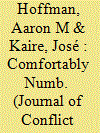

|
|
|
|
|
| Summary/Abstract |
Exposure to a single report about terrorism in the mass media can trigger a range of emotional and political reactions. The consequences of exposure to several terrorism reports in row, however, are a matter of controversy. We examine the effects of prolonged terrorism coverage using an experimental design that combines self-report measures of emotions and political attitudes with instantaneous biometric data on emotions. Consistent with research on nonassociational learning, we find that exposure to multiple videos habituates people to depictions of terrorism: the longer people watch terrorism coverage, the less intense their reactions are to the images of terrorism they see. Some images and videos, however, contribute to this result more than others. This suggests that the ultimate effects of terrorism coverage depend on the interplay between the quantity and quality of reporting, not the quantity alone.
|
|
|
|
|
|
|
|
|
|
|
|
|
|
|
|
| 10 |
ID:
071776
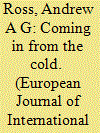

|
|
|
|
|
| Publication |
2006.
|
| Summary/Abstract |
A variety of constructivists have begun to address emotions in IR, viewing emotional events and memories as important dimensions to the social construction of identity. But it is not clear that constructivist tools, designed in most cases for interpreting discursive representations, are equipped to study affective phenomena. This article offers a critical assessment of constructivism's ability to theorize affects-nonconscious and embodied emotional states-in global politics. Using as an example the ontology developed by Alexander Wendt, the article suggests that common presuppositions in orthodox constructivism in fact obstruct the study of affect and its role in social and political life. To grasp the depth, intensity, and fugitivity of emotional phenomena, constructivism needs to rethink its attachments to reflective agency, ideational processes, and symbolic meaning. Through a brief discussion of the American response to 9/11, the final section develops several propositions on the role of affect in forging political identities.
|
|
|
|
|
|
|
|
|
|
|
|
|
|
|
|
| 11 |
ID:
183709
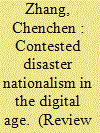

|
|
|
|
|
| Summary/Abstract |
This article examines how affective narratives of the COVID-19 pandemic on Chinese social media reinforce and challenge established scripts of national identity, political legitimacy, and international geopolitical imaginary. Taking theoretical insights from the scholarship on trauma, disaster nationalism, and politics of emotions, I structure the analysis of social media posts from state media and private accounts around three emotional registers: grief as a crucial site of control and contestation during the initial stage of the outbreak; gandong (being moved in a positive way) associated with stories of heroic sacrifices, national unity, and mundane ‘heart-warming’ moments; and enmity in narratives of power struggles and ideological competition between China and ‘the West’, especially the United States. While state media has sought to transform the crisis into resources for strengthening national belonging and regime legitimacy through a digital reworking of the long-standing repertoire of disaster nationalism, alternative articulations of grief, rage, and vernacular memory that refuse to be incorporated into the ‘correct collective memory’ of a nationalised tragedy have persisted in digital space. Furthermore, the article explicates the ways in which popular narratives affectively reinscribe dominant ideas about the (inter)national community: such as the historical imagination of a continuous nationhood rising from disasters and humiliation, positive energy, and a dichotomous view of the international order characterised by Western hegemony and Chinese victimhood. The geopolitical narratives of the pandemic build on and exacerbate binary oppositions between China and ‘the West’ in the global imaginary, which are co-constructed through discursive practices on both sides in mutually reinforcing ways. The lens of emotion allows us to attend to the resonances and dissonances between official and popular narrativisations of the disaster without assuming a one-way determinate relationship between the two.
|
|
|
|
|
|
|
|
|
|
|
|
|
|
|
|
| 12 |
ID:
184578
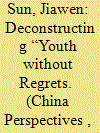

|
|
|
|
|
| Summary/Abstract |
Among the many slogans and descriptive terms concerning educated youth, “youth without regrets” occupies a special place. On the one hand, it is one of the earliest and best-known slogans about educated youth, and even became a cultural symbol of China in the 1990s. On the other hand, its initial association with educated youth and popularity actually reflect not so much a coincidence as a complicity between the popular and state narratives. This article thus analyses in depth the whole range of issues related to the slogan "youth without regrets": the social context and political reasons for its emergence, the process that led to its popularity, its real meaning, and the common misunderstandings surrounding it, as well as the social, cultural, and political functions hidden behind its popularity.
|
|
|
|
|
|
|
|
|
|
|
|
|
|
|
|
| 13 |
ID:
178690
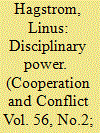

|
|
|
|
|
| Summary/Abstract |
This article draws on identity construction, emotions and a notion of productive power to address the question of why Swedish policymakers and public opinion are becoming increasingly supportive of NATO membership. It contributes theoretically by arguing that such textual phenomena intertwine with ‘disciplinary power’, which operates on the bodies of the subjects of power, exposing them to verbal and physical sanctions, a host of complex feelings and enhanced levels of self-disciplining. The article analyses 354 editorials and op-eds related to Sweden and NATO, published in the four biggest Swedish newspapers in 2014–2018; 1408 tweets, with a focus on 14 selected NATO campaigners and their advocacy; and semi-structured interviews with 12 such influencers. It concludes that Swedish NATO campaigners produce and negotiate emotional discourses in a way that targets other influencers and potential influencers by exposing them to ridicule and allegations of treason. While tendencies are similar on both sides of the debate, the article demonstrates that productive power currently intertwines with disciplinary power in a way that makes anti-NATO advocacy seem more fraught with personal risk than pro-NATO campaigning, and joining NATO appear to be the most normal, realistic and responsible policy option.
|
|
|
|
|
|
|
|
|
|
|
|
|
|
|
|
| 14 |
ID:
193216
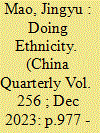

|
|
|
|
|
| Summary/Abstract |
Drawing on lengthy ethnographic fieldwork with ethnic performers in South-West China, this article seeks to explore the multi-layered ethnic scripts in contemporary China. Ethnic performers are people who perform ethnic songs and dances in restaurants or tourist sites, most of whom are rural–urban migrants from ethnic minority backgrounds. Ethnic performers’ ambivalences regarding whether they are “authentic minorities” points to the inadequacy of attempting to understand ethnicity in an essentialized way. Understanding ethnicity as something people do rather than who they are, the concept of “ethnic scripts” is proposed as a conceptual tool to illuminate the cultural and social repertoires which deeply shape people's understanding of and ways of doing ethnicity. By exploring the multi-layered meaning of ethnic scripts in contemporary China, this article highlights the ways that ethnic scripts are closely related to migrant performers’ emotions and sense of self, and addresses the fact that ethnic scripts are inherently gendered.
|
|
|
|
|
|
|
|
|
|
|
|
|
|
|
|
| 15 |
ID:
148154
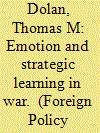

|
|
|
|
|
| Summary/Abstract |
This paper applies the framework of affective intelligence theory—a theory of how emotions affect attitudes, beliefs, and decision making—to elite learning during war time. Doing so provides novel hypotheses about when and how war leaders respond to new events. These hypotheses are tested using a set of cases drawn from the Winter War. Findings suggest that these emotion-derived hypotheses may be more effective in predicting learning and its absence than purely Bayesian or extant cognitive models of learning.
|
|
|
|
|
|
|
|
|
|
|
|
|
|
|
|
| 16 |
ID:
120162
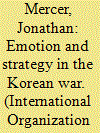

|
|
|
|
|
| Publication |
2013.
|
| Summary/Abstract |
What makes a diplomatic or military signal credible? In strategic settings where deception is possible, rational actors' interpretations rely on their beliefs, intuition, and imagination-they rely on emotion. Two properties of emotion-as an assimilation mechanism and its use as evidence-are key to addressing four strategic problems. First, emotion explains why actors worry needlessly about their reputations. Second, emotion is important to understanding costly signals. Third, emotion explains radical changes in preferences. Fourth, emotion sharpens understanding of strategic problems without being self-invalidating: common knowledge of emotion's effects do not always change those effects. Understanding how rational actors think requires turning to emotion. Evidence from the Korean War captures strengths and weaknesses of competing perspectives.
|
|
|
|
|
|
|
|
|
|
|
|
|
|
|
|
| 17 |
ID:
113886
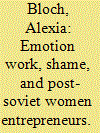

|
|
|
|
|
| Publication |
2011.
|
| Summary/Abstract |
Drawing on ethnographic research among Russian women traders or "shuttle traders" (chelnoki), I examine discourses on shame as a type of emotion work and consider links to ideal gender roles among Russian women entrepreneurs. In a post-Soviet era increasingly shaped by transnational mobility, as well as by a persistent legacy of Soviet sensibilities, a focus on emotion among women traders provides an ideal lens for considering what travels between eras marked by distinct ideologies, between nation-states, and between public and domestic spaces. A discourse of shame links Soviet sensibilities of proper labor and contemporary gender sensibilities that continue to elevate men as breadwinners; thus, a focus on shame enables us to see the contradictory ways in which women are positioned in local and global economies in the 2000s. This case shows how Russian women's insertion into the global economy beginning in the early 1990s has required emotion work that is similar to that required in other locations where global capitalism has brought about reconfigurations of work lives and required people to renegotiate gender roles, expressions of power, and the meaning of labor in their lives.
|
|
|
|
|
|
|
|
|
|
|
|
|
|
|
|
| 18 |
ID:
126707
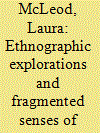

|
|
|
|
|
| Publication |
2013.
|
| Summary/Abstract |
Forum: The State of Feminist Security Studies: Continuing the Conversation. This forum comprises seven pieces conceived in response to the recent Politics & Gender Critical Perspectives section that featured contributions from Carol Cohn, Valerie Hudson, Jennifer Lobasz, Laura Sjoberg, Ann Tickner, Annick Wibben, and Lauren Wilcox (P&G 2011, Vol. 7, Issue 4). Throughout, we refer to this collection as "the CP section."
|
|
|
|
|
|
|
|
|
|
|
|
|
|
|
|
| 19 |
ID:
137676
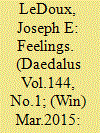

|
|
|
|
|
| Summary/Abstract |
Traditionally, we define “emotions” as feelings and “feelings” as conscious experiences. Conscious experiences are not readily studied in animals. However, animal research is essential to understanding the brain mechanisms underlying psychological function. So how can we make study mechanisms related to emotion in animals? I argue that our approach to this topic has been flawed and propose a way out of the dilemma: to separate processes that control so-called emotional behavior from the processes that give rise to conscious feelings (these are often assumed to be products of the same brain system). I will use research on fear to explain the way that I and many others have studied fear in the laboratory, and then turn to the deep roots of what is typically called fear behavior (but is more appropriately called defensive behavior). I will illustrate how the processes that control defensive behavior do not necessarily result in conscious feelings in people. I conclude that brain mechanisms that detect and respond to threats non-consciously contribute to, but are not the same as, mechanisms that give rise to conscious feelings of fear. This distinction has important implications for fear and anxiety disorders, since symptoms based on non-conscious and conscious processes may be vulnerable to different factors and subject to different forms of treatment.
|
|
|
|
|
|
|
|
|
|
|
|
|
|
|
|
| 20 |
ID:
196571


|
|
|
|
|
| Summary/Abstract |
This article investigates the motivations and affiliations of Syrian fighters within the Third Corp, emphasizing the role of emotionality, identity transformation, and fusion in shaping fighter behavior and decision-making. Through qualitative analysis of interviews with fighters, the study explores how episodic memories, rituals, and shared dysphoric experiences contribute to a complex sense of belonging and solidarity, challenging traditional notions of identity in conflict settings. By employing the concept of identity fusion, the research highlights the construction of psychological kinship and the profound impact of shared emotional dynamics on group cohesion. This study provides insights into the genesis, evolution, and potential resolutions of conflicts, offering a nuanced understanding of fighters’ motivations and the implications for peace processes in Syria and beyond.
|
|
|
|
|
|
|
|
|
|
|
|
|
|
|
|
|
|
|
|
|